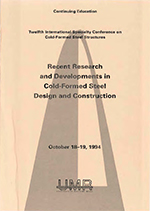Location
Saint Louis, Missouri
Session Dates
18 Oct 1994
Abstract
The elastoplastic large deflection behaviour of cold-formed members is analysed by a nonlinear spline finite strip method. The method is developed using the principle of virtual work, based on the total Lagrangian description. It is used to deal with problems of geometric and material nonlinearity. The displacement function of a strip is expressed as the product of transverse interpolation polynomials and longitudinal B3-splines. The effect of arbitrary initial imperfections is taken into consideration. The influence of cold-bending residual stress on the local and overall behaviour of cold-formed lipped angle columns is investigated especially. The numeric examples show that the method possesses such advantages as fewer degrees of freedom, fine continuity, good boundary adaptation, quick computation speed and high accuracy etc.
Department(s)
Civil, Architectural and Environmental Engineering
Research Center/Lab(s)
Wei-Wen Yu Center for Cold-Formed Steel Structures
Meeting Name
12th International Specialty Conference on Cold-Formed Steel Structures
Publisher
University of Missouri--Rolla
Document Version
Final Version
Rights
© 1994 University of Missouri--Rolla, All rights reserved.
Document Type
Article - Conference proceedings
File Type
text
Language
English
Recommended Citation
Chen, Shi-Lin; Li, Shao-Fu; and Fang, Shan-Feng, "Elastoplastic Large Deflection Analysis of Cold-formed Members Using Spline Finite Strip Method" (1994). CCFSS Proceedings of International Specialty Conference on Cold-Formed Steel Structures (1971 - 2018). 4.
https://scholarsmine.mst.edu/isccss/12iccfss/12iccfss-session5/4
Elastoplastic Large Deflection Analysis of Cold-formed Members Using Spline Finite Strip Method
Saint Louis, Missouri
The elastoplastic large deflection behaviour of cold-formed members is analysed by a nonlinear spline finite strip method. The method is developed using the principle of virtual work, based on the total Lagrangian description. It is used to deal with problems of geometric and material nonlinearity. The displacement function of a strip is expressed as the product of transverse interpolation polynomials and longitudinal B3-splines. The effect of arbitrary initial imperfections is taken into consideration. The influence of cold-bending residual stress on the local and overall behaviour of cold-formed lipped angle columns is investigated especially. The numeric examples show that the method possesses such advantages as fewer degrees of freedom, fine continuity, good boundary adaptation, quick computation speed and high accuracy etc.



